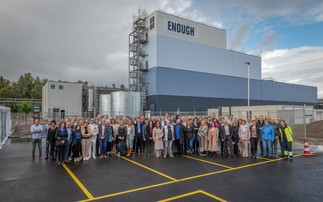BusinessGreen caught up with Unilever's chief executive after the company announced it would become 'carbon positive' by 2030
World leaders are gathering in Paris today, kicking off a fortnight of intense negotiations between nearly 200 countries, with the aim of agreeing a deal to tackle climate change.
Unilever has been a leading voices among the many businesses showing their support for a deal, and last week announced a plan to become "carbon positive" by 2030, as part of its efforts to limit rising temperatures.
Ahead of the summit, BusinessGreen caught up with Paul Polman, chief executive of Unilever who has championed the company's environmental efforts through its Sustainable Living Plan.
James Murray: What result would Unilever like to see from the Paris Summit? What do you think are the chances of this result being delivered?
Paul Polman: It is not a question of whether we will achieve an agreement in Paris this year - we undoubtedly will - but rather of how ambitious it will be. A high level of ambition is needed, which will act as a strong signal to investors, but we also more companies committing to tackling climate change.
A good climate policy would send a strong signal to businesses and investors about the commitment of governments to decarbonising the global economy. Along with other businesses we are advocating for a Paris agreement which commits to, amongst other things:
- A clear long term goal for decarbonising our economy and reaching net zero greenhouse gas emissions by 2050
- National contributions at the highest end of ambition
- A mechanism for strengthening national contributions every five years
- As well as further progress on eliminating deforestation - we can't keep global warming to less than 2˚C unless forests are protected.
Paris is just the start rather than the end of the journey. We need to ensure that the conversation quickly turns to implementation with a clear view on 2016 and beyond. And, we really need businesses to step up and show leadership.
Businesses must give confidence to governments that economies can grow inclusively and sustainably and that policies which reward sustainable behaviour are better for the bottom line.
There are many ways businesses can commit such as setting ambitious science-based carbon reduction targets; joining the call for net zero emissions by 2050; setting a price on carbon in their internal operations; and, joining RE100 to move to 100 per cent renewable electricity. We also hope that business leaders will add their names to the Paris Pledge for Action, which will be unveiled during the negotiations.
JM: What are your biggest fears for the summit? Where do you see the biggest risks of failure?
PP: That we don't get an agreement sufficiently ambitious to tackle the issues facing the world today. An agreement which is not ambitious enough in terms of its scope and reach could have potentially disastrous consequences.
Runaway climate change could wipe out development gains of the last century in little more than a generation. The World Bank now estimates that climate change could push more than 100 million additional people back into poverty by 2030. This is not acceptable for governments, the private sector, civil society and humanity as a whole.










